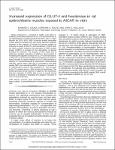Increased expression of GLUT-4 and hexokinase in rat epitrochlearis muscles exposed to AICAR in vitro

View/
Date
2000Author
Ojuka, Edward O.
Nolte, Lorraine A.
Holloszy, John O.
Metadata
Show full item recordAbstract
Increased expression of GLUT-4 and hexokinase in
rat epitrochlearis muscles exposed to AICAR in vitro. J. Appl.
Physiol. 88: 1072–1075, 2000.—Exercise acutely stimulates
muscle glucose transport and also brings about an adaptive
increase in the capacity of muscle for glucose uptake by
inducing increases in GLUT-4 and hexokinase.1 Recent studies
have provided evidence that activation of AMP protein
kinase (AMPK) is involved in the stimulation of glucose
transport by exercise. The purpose of this study was to
determine whether activation of AMPK is also involved in
mediating the adaptive increases in GLUT-4 and hexokinase.
To this end, we examined the effect of incubating rat epitrochlearis
muscles in culture medium for 18 h in the presence or
absence of 5-aminoimidazole-4-carboxamide ribonucleoside
(AICAR), which enters cells and is converted to the AMP
analog ZMP, thus activating AMPK. Exposure of muscles to
0.5 mMAICAR in vitro for 18 h resulted in an ,50% increase
in GLUT-4 protein and an ,80% increase in hexokinase. This
finding provides strong evidence in support of the hypothesis
that the activation of AMPK that occurs in muscle during
exercise is involved in mediating the adaptive increases in
GLUT-4 and hexokinase.
AMP kinase; exercise; gene expression; skeletal muscle;
tissue culture; 5-aminoimidazole-4-carboxamide ribonucleoside
